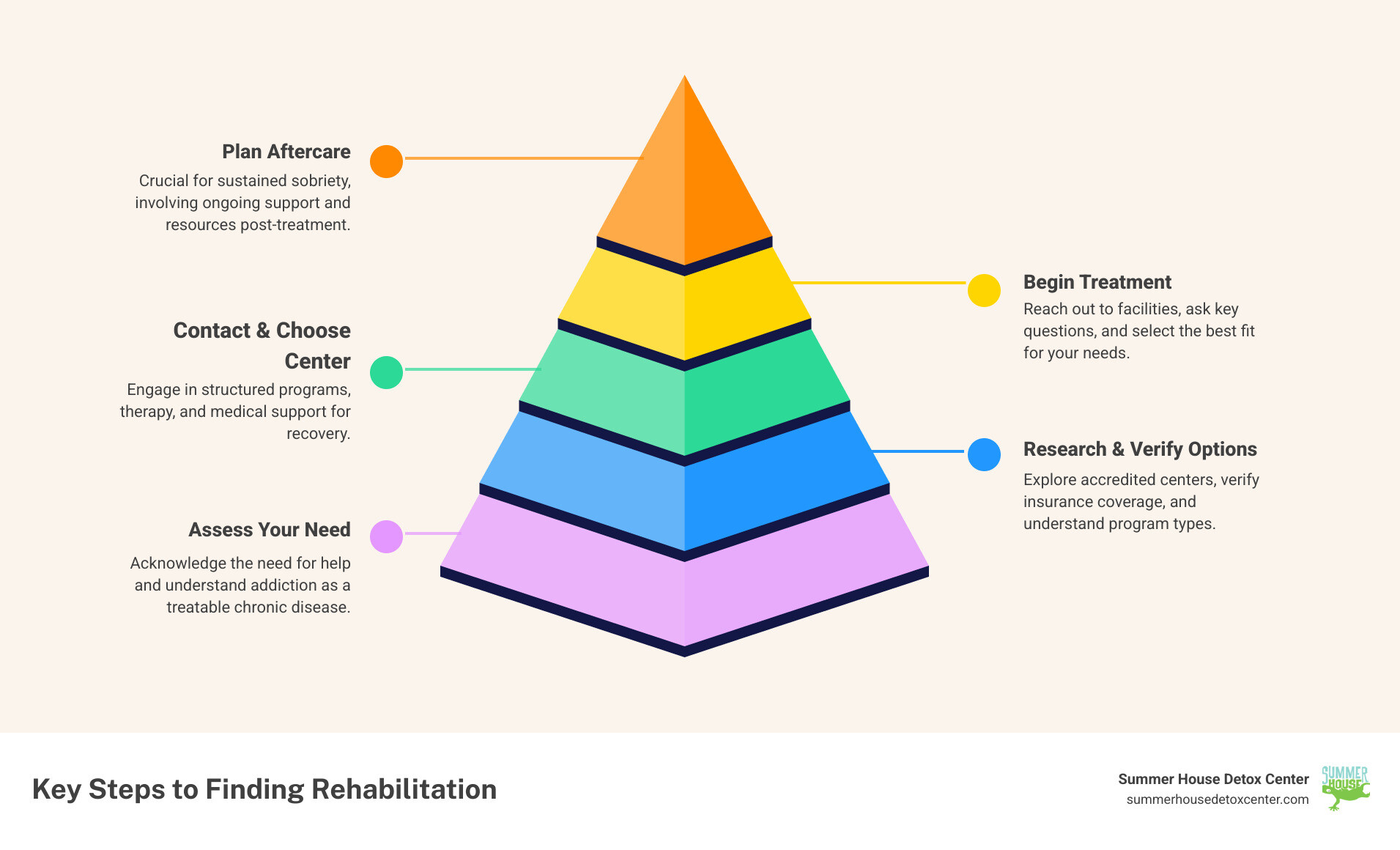Starting Your Journey: Understanding Drug Rehabilitation
If you’re searching for drug rehabilitation near me, getting quick, reliable information is crucial. The path to recovery begins with a single step, and knowing where to turn can make all the difference. Here’s how you can find immediate help:
- SAMHSA’s National Helpline: Call 1-800-662-HELP (4357). This is a confidential, free, 24/7 resource for information and treatment referrals for individuals and families facing mental and/or substance use disorders.
- Online Directories: Use trusted resources like SAMHSA’s FindTreatment.gov. This official government site allows you to search for licensed and accredited facilities by location, services offered, and payment options.
- Talk to Your Doctor: Your primary care physician is a confidential and knowledgeable resource. They can assess your overall health, provide an initial screening, and offer professional referrals to trusted local treatment options.
- Check with Your Insurance: Your health insurance provider can give you a list of in-network rehabilitation centers. Understanding your policy’s coverage for detox, inpatient, and outpatient care is a critical financial step.
Finding drug rehabilitation near me means taking a courageous first step towards a healthier life. Drug rehabilitation is a comprehensive process of medical and psychotherapeutic treatment for dependence on psychoactive substances. It’s designed not just to stop substance use, but to help individuals overcome destructive habits, address underlying issues, and regain a healthy, drug-free life.
Addiction is a complex and often misunderstood illness. It’s a chronic, relapsing disease that fundamentally changes the brain’s structure and function, altering reward pathways, motivation, and decision-making. Millions of Americans face this challenge every year. In 2021, over 46 million people aged 12 or older had a substance use disorder. Despite the prevalence, a significant treatment gap remains. Far too few receive the help they need; in 2022, only about 13.1 million out of 54.6 million people who needed treatment received any kind of care. This gap is often due to stigma, fear of withdrawal, financial concerns, or simply not knowing where to turn.
Seeking help can feel overwhelming, especially when fears about withdrawal symptoms or past unsuccessful attempts at sobriety linger. But remember that recovery is possible for everyone.
As one person shared, “Freedom from addiction can move your life forward in powerful ways. Better health, stronger relationships, steady employment and living with purpose – these are among the rewards of recovery.”
This journey is about more than just abstinence; it’s about change. Rehabilitation offers a path to lasting change and hope for new beginnings. It provides a structured, supportive environment, professional guidance, and the essential tools to rebuild your life on a solid foundation of health and well-being.

Key terms for drug rehabilitation near me:
Understanding the Different Types of Rehab Programs
When you’re exploring options for drug rehabilitation near me, it’s so important to know that treatment isn’t a “one-size-fits-all” journey. Just like each person is unique, so too are their paths to recovery. A thorough initial assessment by a clinical professional is the first step to determining the appropriate level of care. That’s why there are different levels of care designed to fit individual needs, from the severity of the addiction to a person’s home environment and co-occurring health conditions. Think of it as a comprehensive roadmap, guiding you through a continuum of care that addresses all aspects of addiction – physical, emotional, and social.
Our goal at Summer House Detox Center is always to provide personalized care that truly resonates with you.
Here’s a look at the various types of programs available:
| Feature | Inpatient/Residential Rehabilitation | Outpatient Rehabilitation |
|---|---|---|
| Structure | Highly structured, 24/7 supervision and support in a dedicated facility. | Flexible scheduling, allowing clients to live at home and attend sessions at a facility. |
| Intensity | High intensity, immersive therapy with round-the-clock medical and therapeutic oversight. | Moderate intensity, with regular therapy sessions that fit around work, school, or family commitments. |
| Cost | Generally higher due to accommodation, meals, and 24/7 care. | Generally lower, as it doesn’t include living expenses at the facility. |
| Ideal Candidate | Individuals with severe addiction, unstable home environments, co-occurring mental health disorders, or those needing to remove themselves completely from triggers. | Individuals with less severe addiction, stable home environments, strong support systems, or those needing to maintain daily responsibilities. |
Medically Supervised Detoxification
The very first step for many people on their recovery journey is medically supervised detoxification. This isn’t just about stopping drug use; it’s about managing the acute and potentially dangerous physical symptoms of withdrawal in a safe and comfortable environment. Withdrawal symptoms can range from uncomfortable to life-threatening, depending on the substance. For example, alcohol or benzodiazepine withdrawal can lead to seizures or delirium tremens (DTs), which require immediate medical intervention. Opioid withdrawal, while typically not fatal, can be excruciatingly painful and lead to severe dehydration. Having medical professionals on hand 24/7 is crucial to manage these risks.
During detox, you’ll receive round-the-clock monitoring of vital signs and compassionate support to manage withdrawal symptoms. Medications may be administered to ease discomfort, reduce cravings, and prevent complications. This process ensures your comfort and dignity during a difficult time. It stabilizes you physically and mentally, preparing your body and mind for the deeper therapeutic work that follows. It’s the essential foundation for a successful recovery journey.
For more information, you can explore Drug and Alcohol Detox in Fort Lauderdale, FL.
Inpatient and Residential Treatment
Once detox is complete, many individuals transition to inpatient or residential treatment. This type of program offers a highly structured, therapeutic environment where you live at the facility for a period, away from everyday triggers and distractions. It provides 24/7 support, allowing you to fully immerse yourself in therapy and healing. A typical day might include individual counseling, group therapy sessions, educational workshops on addiction and relapse prevention, and holistic activities like yoga or meditation.
You’ll participate in intensive individual and group therapy, learning new coping skills and understanding the roots of your addiction. The peer support from others going through similar experiences is incredibly powerful, creating a sense of community and shared purpose. This immersive setting helps you build a strong foundation for long-term sobriety by focusing entirely on recovery without external pressures.
To learn more about comprehensive care, visit Comprehensive Care Inside Miami’s Premier Drug Rehab Facilities.
Outpatient Treatment Support and Step-Down Care
Outpatient treatment offers more flexibility, allowing you to live at home while attending therapy sessions. This can be ideal if you have stable living arrangements, a strong support system, and commitments like work or family that you need to maintain. It’s also a common “step-down” option after completing detox or an inpatient program, acting as a bridge back to everyday life. Levels of outpatient care vary:
- Partial Hospitalization Programs (PHP): The most intensive form of outpatient care, often involving treatment for several hours a day, five to seven days a week.
- Intensive Outpatient Programs (IOP): A step down from PHP, typically requiring 9-20 hours of treatment per week, spread across several days.
- Standard Outpatient: The least intensive option, usually involving one or two therapy sessions per week.
Outpatient programs provide ongoing therapy and support, helping you integrate recovery into your daily life. They ensure you continue to build on the skills you’ve learned. Summer House Detox Center can help coordinate this continued care, ensuring a smooth transition and ongoing support for your journey.
Program Duration: Short-Term vs. Long-Term
The length of a rehab program can vary greatly depending on individual needs, the substance used, and the severity of the addiction. You might hear about 30-day programs, 60-day programs, or 90-day programs. While short-term programs can be effective for some, research from the National Institute on Drug Abuse (NIDA) suggests that programs lasting 90 days or longer are often more effective for achieving long-term sobriety. Longer durations provide more time to break old patterns, solidify new coping skills, and develop a strong relapse prevention plan.
The goal is always to provide enough time for you to stabilize, learn new coping mechanisms, and develop a strong relapse prevention plan. The right duration is not a one-size-fits-all number; your individual needs and clinical progress will guide the recommended length of stay.
Treating Co-Occurring Disorders (Dual Diagnosis)
It’s very common for people struggling with substance use disorder to also experience mental health conditions like anxiety, depression, bipolar disorder, or trauma (PTSD). This is often called a dual diagnosis or co-occurring disorders. In fact, nearly 50% of individuals with a substance use disorder also have a co-occurring mental health condition. The relationship is often intertwined: some people use substances to self-medicate the symptoms of an untreated mental illness, while substance use can also trigger or worsen mental health symptoms.
Effective treatment must be integrated, addressing care for both the mental health condition and the substance abuse simultaneously. Treating one without the other is often ineffective and can lead to relapse. An integrated approach involves a team of professionals—including therapists, psychiatrists, and addiction specialists—who work together to create a unified treatment plan. By treating both conditions at the same time, individuals have a much better chance at achieving lasting recovery and overall well-being.
